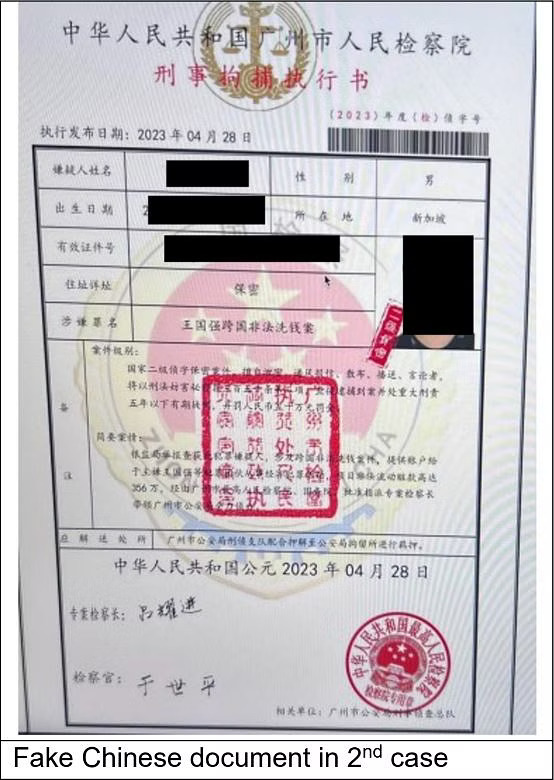Regardless of how much experience we have with technology, there’s no doubt that most of us are still prone to being scammed online.
Especially since scams have gotten more and more elaborate over time.
On that note, two young men were recently scammed by scammers who acted as China government officials.
The two young men, aged 19 and 21, were first embroiled in the scam after someone called them and claimed to be an officer from the Immigration and Checkpoints Authority (ICA).
According to investigations by the Singapore Police Force (SPF), the scammers also told the victims separately that a parcel with “prohibited items in Singapore” registered under the victim’s name had been found by authorities.
Thereafter, the scammers started posing as police officers from China by sending fake Chinese police documents to their victims.

These documents “proved” that the men had committed crimes, with the scammers adding that this might have occurred due to a case of misused identity.
The victims, who were in contact with the scammers via messaging applications, were eventually prompted to send personal information about themselves and their family background to the scammers after the scammers instructed them to cooperate with the investigations.

One victim even ended up losing around S$63,000.
Timeline for First Victim
And if you’re already confused about what happened, here’s a fuss-free, condensed timeline just for you.
March 2023: The first victim was first contacted by the scammers during this period of time.
After being told about his alleged involvement in crimes, the scammers said he could choose to either post bail, which would be worth S$15,000, or be arrested and taken back to China through extradition to be charged.
He was also told not to inform others, including his parents, about the investigation.
10 April 2023: The victim chose to post bail. He obtained the S$15,000 from his mother after telling her that it was to pay for his school fees and transferred the money to a bank account provided by the scammers.
Thereafter, the scammers told him to delete all chat logs with them. This included the details about the bank transfer.
Two Weeks Later: The scammers contacted the victim again and told him to pay S$48,000 to “prove his innocence”.
Thinking that a failure to comply would result in a delay in investigations, the man lied to his mother again to obtain the S$48,000.
After receiving the money, he transferred it to two different bank accounts in China.
27 April 2023: The scammers messaged the victim again and told him to write a promissory note.
The note was “proof” that he had incurred a debt of 2,580,000 yuan (approximately S$496,000).
Apart from that, the scammers instructed the victim to take a selfie of himself with the note and his China identity card.
And if you’re wondering, “How could anyone agree to this?”, the SPF mentioned that the victim was under the assumption that the photograph had to be sent if he wanted a prosecutor to clear his case.
28 April 2023: Using the selfie and information sent to them, the scammers contacted the victim’s mother and sent threats to her.
According to screenshots provided by the SPF, the scammers warned the man’s mother to “not test their limits” and even said that they would “chop off” one of his limbs.

The victim was unaware of this.
After failing to get in contact with her son, the victim’s mother contacted the SPF for assistance.
By this time, the victim had already lost around $63,000 to the scammers.
Timeline for Second Victim
For the second victim, the narrative was largely similar: The scammers told him to either post bail or be extradited to China to face his “charges”.
However, the scammers requested bail of 1,000,000 yuan (approximately S$192,000) this time round.
The victim told the scammers that he did not have money.
Which sounds like most of us whenever someone asks us for money.
After hearing this, the scammers exploited the victim by requesting to talk to his parents instead, which prompted the victim to reveal his WeChat User ID.
The scammers then used the information to contact the victim’s parents in China and ask his parents for a payment of 100,000 yuan (approximately S$19,000).
Just like the first victim’s encounter, the scammers also claimed that the payment was for a gambling debt “incurred” by the victim.
Thankfully for the second victim, his parents did not transfer the money to the scammers.
His parents tried to contact him but failed to do so, and they eventually contacted the SPF as well.
Police Were Informed of Both Cases on 28 and 29 April
When speaking about the incident on Thursday (4 May), the police confirmed that the two victims’ parents had lodged separate reports on 28 and 29 April.
Both cases had similar stories, as both sets of parents were under the impression that their sons had been “held captive”.
The two victims’ parents had also been instructed to pay for “gambling debts”, which the scammers claimed belonged to their sons. Otherwise, their sons would be hurt.
Apart from that, the SPF revealed that the scammers had ordered the victims to “report” to them three times each day through chat messaging applications.
They revealed their bank account details as well.
After receiving the reports, officers from the Clementi Police Division, Central Police Division, Tanglin Police Division, Criminal Investigation Department, Police Intelligence Department and Commercial Affairs Department sprang into action and carried out widescale investigations.
Thankfully, the victims in both cases were found within three hours of their parents’ reports.
How to Protect Yourself From Scams
When speaking about the incident and how individuals can avoid finding themselves in similar situations, the police emphasised that overseas law enforcement agencies have to seek approval from the Singapore Government before carrying out law-related activities.
Without the approval, they have no jurisdiction, meaning that they cannot conduct operations, arrest individuals or enlist the help of people to aid in investigations.
Beyond scams like the ones mentioned above, SPF said that security features, such as two-factor authentication, should be activated for mobile applications that handle individuals’ personal information.
Government Officials Will Never Ask for Bank Account Information
When transferring money, individuals should only transfer it to people whom they know in real life.
Members of the public should also avoid sharing their bank account information or other personal details through phone calls and should take note of calls from unknown numbers too.
The SPF also highlighted that legitimate messages from government agencies would never require members of the public to share their bank account details.
Websites and Applications to Prevent Scams and Receive More Information
Apart from that, SPF encouraged members of the public to download the ScamShield mobile application, which filters and blocks scam calls or messages.
Members of the public can also obtain more information and advice from the ScamAlert website or call the Anti-Scam Helpline at 1800-722-6688 if needed.
How to Report Scams
As for those who suspect that they might have relevant information regarding scams, they can contact the police at 1800-255-0000 or submit their information via the I-Witness website.
The I-Witness website allows members of the public to report any information regarding crimes, and individuals can choose to do so anonymously if they wish.
Those who encounter fraudulent transactions should also report them as soon as possible.
Individuals can also spread the relevant information to their loved ones so that they do not fall victim to the same scams.
If urgent police assistance is required, individuals can call 999.
Join our Telegram channel for more entertaining and informative articles at https://t.me/goodyfeedsg or download the Goody Feed app here: https://goodyfeed.com/app/
Similar Scams in the Past
And it seems like this isn’t the first time such scams have happened.
In 2021, a 21-year-old student from China fell victim to a similar scam after a scammer posing as a police officer from China contacted him.
Unlike the most recent cases, the scammer accused the victim of money laundering offences and was told to stay at a hotel booked for him.
The victim later travelled to another person’s house, where he posed topless, gagged and blindfolded for an “X-ray”.
He obliged after being told that it was part of the investigation.
Later, the image was sent to his parents in China alongside a demand for a ransom worth 6,000,000 yuan (approximately S$1,150,000).
The student’s parents did not pay the ransom, causing the scammer to tell the student to cut all contact with his family and friends.
Eventually, the student’s parents filed a police report, and two scammers involved in the case were called to assist with police investigations.
Would you be jailed for being half-naked in public? Well, the answer will shock you. Seriously. Watch this to the end and you'll understand:



